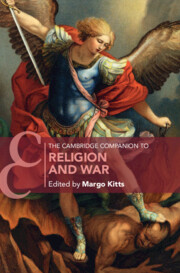Refine search
Actions for selected content:
60 results
2 - Passage to India
-
- Book:
- Land, Law and Empire
- Published online:
- 01 September 2025
- Print publication:
- 07 August 2025, pp 35-67
-
- Chapter
- Export citation
3 - Beyond the Free Sea
- from Part I - International Law in Renaissance Europe (1492–1660)
-
-
- Book:
- The Cambridge History of International Law
- Published online:
- 22 April 2025
- Print publication:
- 08 May 2025, pp 107-134
-
- Chapter
- Export citation
15 - War and the Use of Force in Old Regime Europe
- from Part II - International Law in Old Regime Europe (1660–1775)
-
-
- Book:
- The Cambridge History of International Law
- Published online:
- 22 April 2025
- Print publication:
- 08 May 2025, pp 495-516
-
- Chapter
- Export citation
5 - Property’s Elements and Scope
- from Part II - The Natural Right to Property
-
- Book:
- Natural Property Rights
- Published online:
- 17 April 2025
- Print publication:
- 24 April 2025, pp 82-104
-
- Chapter
- Export citation
1 - Barbeyrac’s Intervention
- from Part I - A Revolution in Rights?
-
-
- Book:
- The Cambridge History of Rights
- Published online:
- 22 January 2025
- Print publication:
- 28 November 2024, pp 15-44
-
- Chapter
- Export citation
2 - The History and Development of Collective Self-Defence
-
- Book:
- Collective Self-Defence in International Law
- Published online:
- 04 January 2024
- Print publication:
- 25 January 2024, pp 66-97
-
- Chapter
- Export citation
5 - Historical Evolution of Norms and Other Means to Restrain the Use of Force
-
- Book:
- A Farewell to Wars
- Published online:
- 09 November 2023
- Print publication:
- 23 November 2023, pp 87-106
-
- Chapter
- Export citation
1 - The Setting of International Law
- from Part I - The Structure of International Law
-
- Book:
- International Law
- Published online:
- 19 October 2023
- Print publication:
- 02 November 2023, pp 3-21
-
- Chapter
- Export citation
3 - The Authority of Public International Law
-
- Book:
- The Authority of International Criminal Law
- Published online:
- 27 July 2023
- Print publication:
- 07 September 2023, pp 35-56
-
- Chapter
- Export citation
Introduction
-
- Book:
- Modern Moral Philosophy
- Published online:
- 10 June 2023
- Print publication:
- 15 June 2023, pp 1-14
-
- Chapter
- Export citation
1 - Grotius
-
- Book:
- Modern Moral Philosophy
- Published online:
- 10 June 2023
- Print publication:
- 15 June 2023, pp 15-38
-
- Chapter
- Export citation

The Cambridge Companion to Religion and War
-
- Published online:
- 04 May 2023
- Print publication:
- 11 May 2023
Chapter 5 - German Freedom and Modern Liberty
-
- Book:
- Herder and Enlightenment Politics
- Published online:
- 30 March 2023
- Print publication:
- 06 April 2023, pp 173-203
-
- Chapter
- Export citation
Chapter 7 - State-Machines, Commerce and the Progress of Humanität in Europe
-
- Book:
- Herder and Enlightenment Politics
- Published online:
- 30 March 2023
- Print publication:
- 06 April 2023, pp 230-275
-
- Chapter
- Export citation
17 - Thucydides in the Renaissance and Reformation
- from Part III - After Thucydides
-
-
- Book:
- The Cambridge Companion to Thucydides
- Published online:
- 02 March 2023
- Print publication:
- 09 March 2023, pp 265-281
-
- Chapter
- Export citation
9 - Data as Social Facts: Distributive Justice Meets Big Data
-
- Book:
- Political Theory of the Digital Age
- Published online:
- 02 February 2023
- Print publication:
- 09 February 2023, pp 183-206
-
- Chapter
- Export citation
10 - The Law of Nations
-
-
- Book:
- The Cambridge Companion to Pufendorf
- Published online:
- 25 November 2022
- Print publication:
- 17 November 2022, pp 236-262
-
- Chapter
- Export citation
4 - Appropriating Nature
- from Part II - Unmaking International Law
-
-
- Book:
- Locating Nature
- Published online:
- 22 September 2022
- Print publication:
- 29 September 2022, pp 111-133
-
- Chapter
- Export citation
Looking Forward Through and Beyond the Western Classics of International Law
-
- Journal:
- Asian Journal of International Law / Volume 13 / Issue 1 / January 2023
- Published online by Cambridge University Press:
- 25 July 2022, pp. 146-168
- Print publication:
- January 2023
-
- Article
- Export citation
Chapter 18 - Cicero and Twenty-First-Century Political Philosophy
-
-
- Book:
- The Cambridge Companion to Cicero's Philosophy
- Published online:
- 08 December 2021
- Print publication:
- 16 December 2021, pp 284-300
-
- Chapter
- Export citation
